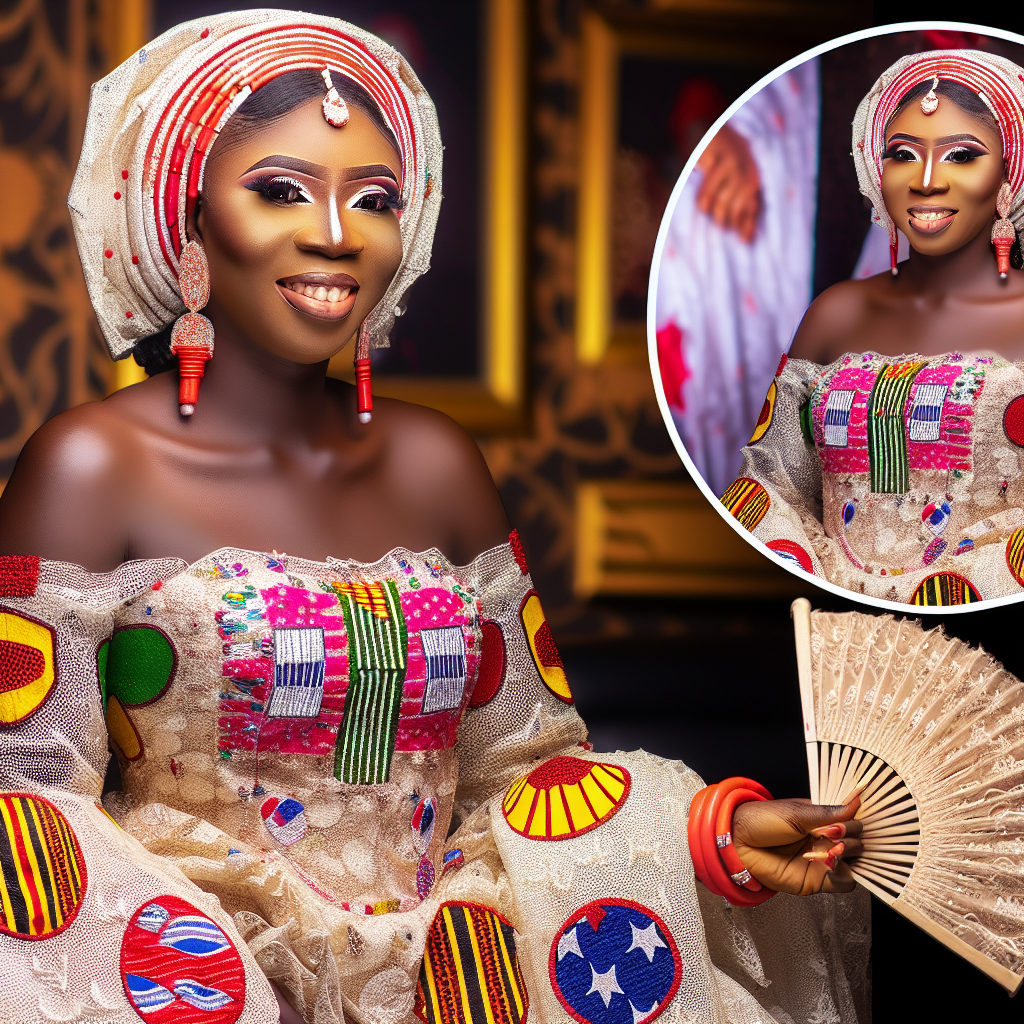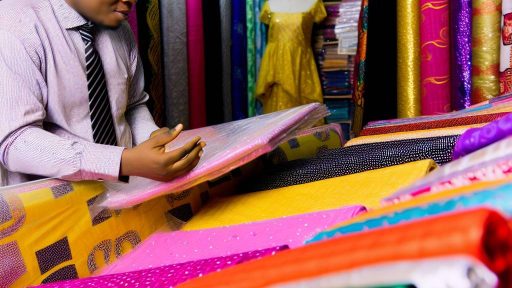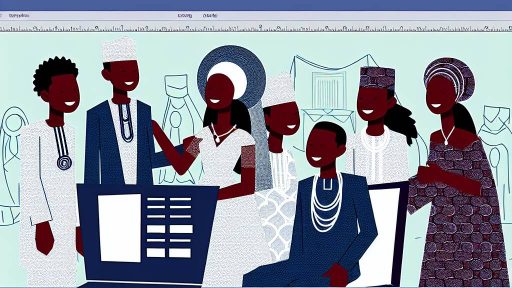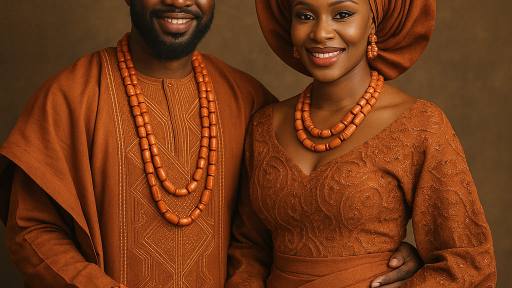Introduction to Nigerian Bridal Fashion and its Cultural Significance
Nigerian bridal fashion reflects the country’s rich cultural heritage.
Each design embodies tradition, identity, and personal expression.
Brides choose outfits that symbolize love, unity, and family.
The colors and styles often have deep meanings that resonate with cultural beliefs.
Moreover, fabric choices can reflect the bride’s background and regional identity.
For instance, Aso Oke is a traditional fabric from the Yoruba people.
It represents prestige and is often worn during significant ceremonies.
Similarly, lace and beaded designs showcase craftsmanship and attention to detail.
Furthermore, headpieces and accessories hold symbolic importance in bridal attire.
They can signify the bride’s status and family legacy.
As a result, each element in a bridal ensemble tells a unique story.
This style celebrates the vibrancy of Nigerian culture.
It also emphasizes the emotional connection to heritage and family roots.
Brides often seek guidance from family and elders when selecting their attire.
This practice honors traditions and fosters a sense of belonging.
Overall, Nigerian bridal fashion is a beautiful blend of art and culture.
Understanding its symbolism helps every bride appreciate her journey.
Understanding Symbolism in Bridal Attire
Colors and Their Meanings
Colors play a vital role in Nigerian bridal fashion.
Each color carries specific cultural symbolism and meaning.
Understanding these meanings helps brides choose wisely.
White
White symbolizes purity and innocence in many cultures.
Nigerian brides often incorporate white into their outfits.
This color conveys a sense of new beginnings.
Red
Red represents love and passion.
In Nigerian weddings, it also signifies fertility.
Brides often wear red to celebrate their love and hope.
Blue
Blue is associated with peace and tranquility.
It represents fidelity and loyalty in marriage.
Some brides choose blue for its calming properties.
Green
Green symbolizes growth and fertility.
This color reflects the couple’s hope for abundance.
Wearing green can signify new life and prosperity.
Yellow
Yellow represents joy and happiness.
This vibrant color adds brightness to any wedding celebration.
Brides wearing yellow radiate positivity and energy.
Gold
Gold is a symbol of wealth and success.
It signifies the bride’s family heritage and status.
This color often adorns traditional attires for its opulence.
Purple
Purple symbolizes royalty and nobility.
It reflects the bride’s status and elegance.
This color often enhances the overall grandeur of the ceremony.
Black
Black is often misunderstood in bridal fashion.
It can symbolize elegance and sophistication.
In some cultures, black is associated with mourning.
However, it can also represent strength and resilience.
Combining Colors
Brides often mix multiple colors for their outfits.
This combination tells a unique story of their heritage.
Furthermore, it adds personal flair to the bridal look.
Understanding Cultural Context
Cultural context dictates color preferences in bridal attire.
Different tribes have distinct meanings for colors.
Brides should research their cultural significance thoroughly.
Popular Fabrics in Nigerian Weddings and Their Symbolic Representations
Aso Oke
Aso Oke is a traditional hand-woven fabric from Nigeria.
This fabric represents cultural heritage and craftsmanship.
Brides often choose Aso Oke for its uniqueness and bold colors.
It symbolizes pride in one’s ethnic roots and traditions.
Lace
Lace is a favored fabric in Nigerian bridal attire.
This delicate material adds elegance and sophistication to any outfit.
Choosing lace can signify purity and grace in a bride.
Moreover, lace often complements traditional jewelry beautifully.
Georgette
Georgette is a lightweight, flowing fabric commonly used in bridal gowns.
This material drapes beautifully, enhancing the bride’s silhouette.
It conveys a sense of romance and femininity.
Furthermore, georgette’s versatility allows for a variety of designs.
Silk
Silk is synonymous with luxury and opulence.
This fabric catches light in a captivating way.
Brides love silk for its sumptuous feel and aesthetic appeal.
Choosing silk often indicates a celebration of love and abundance.
Ankara
Ankara fabric is known for its vibrant patterns and colors.
This cotton fabric showcases modern African creativity.
Wearing Ankara symbolizes joy and cultural pride.
Additionally, it allows brides to incorporate contemporary styles.
Total Ethnic Fusion
Brides often blend various fabrics for a unique look.
This fusion represents the harmony of tradition and modernity.
Mixing fabrics like Aso Oke and lace creates stunning combinations.
Such choices reflect personal style and individual stories.
Uncover the Details: How Grooms Are Redefining Nigerian Wedding Fashion
Jewelry and Accessories: How They Enhance the Bridal Symbolism
The Importance of Jewelry in Nigerian Bridal Fashion
Jewelry plays a vital role in Nigerian bridal fashion.
It symbolizes wealth, status, and cultural heritage.
Brides often wear intricate pieces that tell their story.
Additionally, jewelry serves as heirlooms passed down through generations.
Thus, it connects brides to their family history.
Types of Jewelry Worn by Nigerian Brides
- Necklaces: Often grand and statement-making.
- Earrings: Delicate or bold designs that complement the outfit.
- Bangles: Symbolize prosperity and joy.
- Headpieces: Traditionally worn to enhance beauty.
Symbolism Behind Specific Pieces
Each type of jewelry carries its distinct meaning.
For example, gold jewelry represents prosperity and wealth.
Similarly, pearls signify purity and innocence.
Brides may choose specific stones for personal significance.
Ultimately, these pieces celebrate love and commitment.
Accessories and Their Role in Wedding Attire
Accessories complete a bridal look with flair.
They can include shawls, handbags, and shoes.
Each accessory should align with the overall theme.
Moreover, they add layers of personality to the attire.
For instance, a traditional clutch can reflect cultural roots.
How Accessories Enhance Symbolism
Accessories carry symbolic meanings that enrich the experience.
A meticulously crafted shawl may symbolize protection.
Furthermore, handmade shoes can represent individual style.
Thus, they contribute to the overall narrative of the wedding.
As a result, brides can express their beliefs and values.
Gain More Insights: From Ankara to Aso-Oke: Nigerian Wedding Fashion Trends to Watch in 2024
Traditional vs. Modern Symbols in Nigerian Bridal Fashion
Traditional Symbolism in Bridal Attire
Nigerian bridal fashion is rich in symbolism and tradition.
Each ethnic group has distinct attire with unique meanings.
For example, the Igbo bride often wears a red and white outfit.
This color scheme symbolizes fertility and purity.
In Yoruba culture, brides traditionally opt for a lace dress paired with an “iro” and “buba.”
These elements represent elegance and cultural heritage.
The use of beads in traditional attire is also significant.
Beads signify wealth, beauty, and marital status.
Furthermore, the intricate designs and patterns hold ancestral stories.
Traditional bridal accessories often include headpieces or “gele.”
This adornment showcases both beauty and heritage.
Modern Interpretations of Traditional Symbols
Modern Nigerian bridal fashion blends tradition with contemporary styles.
Brides today are mixing traditional pieces with modern silhouettes.
One popular trend includes the use of elaborate gowns.
These gowns often feature traditional embroidery and embellishments.
Many brides now choose to wear a two-in-one outfit.
This combination allows for a stunning transformation during the ceremony.
Moreover, contemporary color palettes are becoming popular.
Brides may select soft pastels or vibrant hues instead of traditional colors.
Thus, modern brides redefine symbolism in their attire.
The Role of Accessories in Symbolism
Accessories play a crucial role in Nigerian bridal fashion.
Brides often adorn themselves with meaningful jewelry.
For example, traditional gold or silver necklaces symbolize prosperity.
Brides may also wear earrings that represent their family’s status.
Additionally, modern accessories have emerged in recent years.
Fashion-forward brides are opting for unique headpieces and veils.
These pieces add a contemporary twist to traditional outfits.
Consequently, accessories enhance the bride’s overall appearance.
They can transform the entire bridal look while maintaining cultural roots.
Nigerian Brides as Symbols of Personal Identity
Nigerian brides today have the opportunity to express their individuality.
Many choose a mix of traditional and modern styles that resonate with them.
This approach allows for a unique expression of personal identity.
Brides are empowered to honor their heritage in innovative ways.
Celebrating cultural significance enriches the bridal experience.
Gain More Insights: Exploring the Latest Trends in Nigerian Traditional Bridal Wear

Regional Variations in Bridal Fashion Symbolism Across Nigeria
Historical Influences on Bridal Fashion
Nigerian bridal fashion reflects diverse historical influences.
Each region has unique traditions influencing attire choices.
The Yoruba, for instance, have rich cultural garments.
These garments symbolize heritage and family values.
Across Nigeria, variations arise from colonial histories.
Some styles incorporate Western elements fused with local designs.
Regional Attire and Symbolism
Bridal attire varies significantly across Nigerian regions.
The Igbo people’s bridal attire is elaborate and colorful.
Typically, it includes traditional fabrics like George and Ankara.
This attire signifies wealth and social status in the community.
In contrast, the Hausa bride often wears a simpler gown.
This gown is elegant, usually adorned with intricate patterns.
The simplicity speaks to modesty and cultural values.
Colors and Their Meanings
Colors play a significant role in Nigerian bridal symbolism.
Each color conveys specific meanings for the couple.
White symbolizes purity and new beginnings for brides.
Red often indicates fertility and prosperity in marriage.
The use of gold reflects wealth and high social status.
Brides carefully select colors to convey their intentions.
Accessories and Their Significance
Accessories complete the bridal look while holding deep meaning.
The traditional headpiece, known as “gele,” is common among Yoruba brides.
It symbolizes femininity and often signifies marital status.
Igbo brides may wear elaborate beaded necklaces called “ijé.”
These necklaces denote wealth and cultural pride.
Accessories are chosen to honor heritage and family connections.
Modern Influences in Bridal Fashion
Modern trends have started to influence traditional bridal attire.
Many brides blend contemporary styles with traditional elements.
This fusion showcases personal taste while honoring heritage.
Couples often incorporate unique elements into their ceremonies.
Such innovations reflect changing societal values and trends.
Bridal fashion continues to evolve with the times.
Uncover the Details: The Rise of Nigerian Bridal Couture and What It Means for Your Big Day
Importance of Patterns and Embellishments in Reflecting Heritage
Significance of Patterns
Patterns hold a deep significance in Nigerian bridal fashion.
They often represent cultural identity and tradition.
Each pattern tells a unique story connected to heritage.
Moreover, patterns can signify social status and beliefs.
Brides should consider the meaning behind their chosen patterns.
Role of Embellishments
Embellishments add beauty and personal flair to bridal attire.
They can reflect the bride’s personality and style preferences.
Additionally, embellishments often showcase craftsmanship and artistry.
Intricate beadwork and embroidery highlight local talent.
Choosing specific embellishments can honor familial traditions.
Bridging Tradition and Modernity
Many brides prefer to blend traditional and modern styles.
This approach creates a unique representation of their identity.
However, maintaining cultural significance is essential.
Brides should choose designs that respect their roots.
Choosing the Right Designer
Working with a knowledgeable designer can enhance the bridal experience.
Seek designers who understand cultural nuances in fashion.
They can guide brides in selecting meaningful patterns and embellishments.
Collaboration with local artisans adds authenticity to the attire.
Embracing Heritage in Bridal Fashion
Understanding the symbolism behind patterns and embellishments enriches bridal fashion.
It helps brides embrace their heritage with pride.
Ultimately, meaningful choices lead to a memorable celebration.
Advice for Brides: Choosing Symbolic Elements for Personal Representation
Understanding Symbolism in Bridal Fashion
Bridal fashion in Nigeria is rich with cultural symbolism.
Every piece of attire tells a story about identity and heritage.
These symbols can embody love, unity, and cultural pride.
Identifying Personal Symbols
Brides should reflect on personal symbols that hold significance.
Consider family traditions and cultural background.
These factors can guide your choice of attire.
Consulting with Designers
Working with a designer can enhance your vision.
They will offer insights on integrating meaningful symbols.
Ensure your designer understands your cultural preferences.
Selecting Colors and Fabrics
Colors in bridal fashion often carry significant meanings.
White may symbolize purity, while red can signify love.
Choose fabrics that resonate with your cultural background.
Lace, silk, or traditional prints can enhance your message.
Incorporating Traditional Accessories
Accessories play a critical role in Nigerian bridal fashion.
Items like gele or beaded necklaces can symbolize wealth.
Consider wearing heirlooms to honor family history.
Creating a Cohesive Look
Ensure that all elements of your outfit complement each other.
A cohesive look reinforces your personal story.
Pay attention to the balance between modern and traditional styles.
Embracing Modern Trends
Today’s bridal fashion blends tradition with contemporary designs.
Explore how modern styles can reflect your unique identity.
This approach can make your bridal look feel fresh yet meaningful.
Additional Resources
Real Nigerian {Traditional} Wedding: Ndidi + Vincent -Munaluchi Bride
Dowry and Bride Price Are Not the Same Thing – Jason Staples




